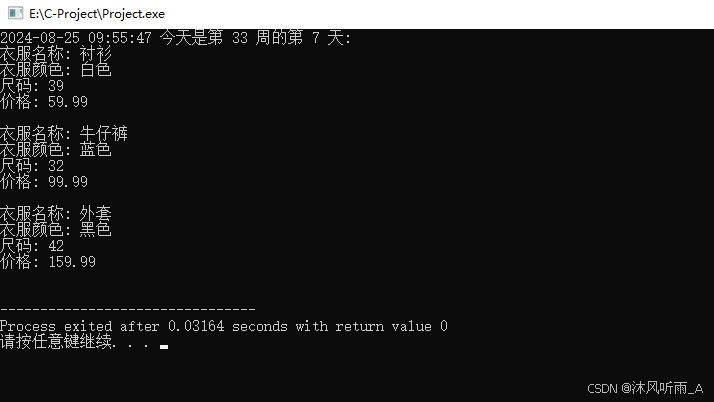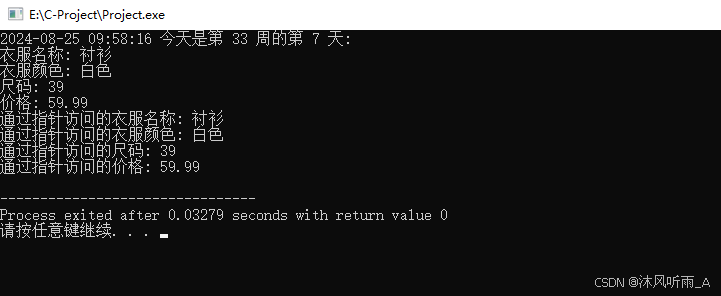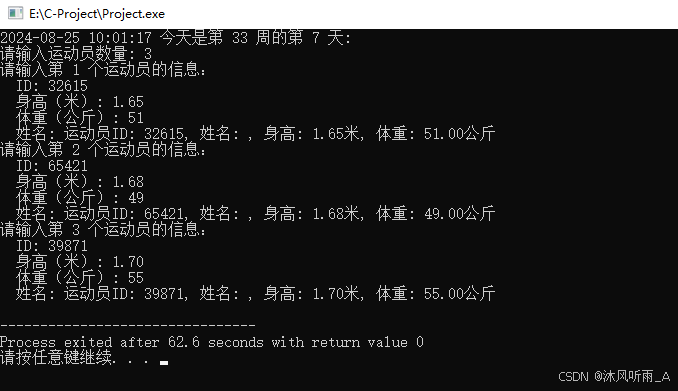C语言中的结构体(Struct)是一种用户自定义的数据类型,允许将不同类型的数据项组合成一个单一的类型:
测试代码1:
cpp
#include "date.h"
#include <stdio.h>
#include <string.h>
// 定义衣服结构体
struct Clothes {
char name[50]; // 衣服名称
char color[20]; // 衣服颜色
int size; // 尺码
float price; // 价格
};
int main() {
int time = getTime();
// 创建衣服结构体数组
struct Clothes clothes[3];
// 使用"."访问并设置每件衣服的信息
strcpy(clothes[0].name, "衬衫");
strcpy(clothes[0].color, "白色");
clothes[0].size = 39;
clothes[0].price = 59.99;
strcpy(clothes[1].name, "牛仔裤");
strcpy(clothes[1].color, "蓝色");
clothes[1].size = 32;
clothes[1].price = 99.99;
strcpy(clothes[2].name, "外套");
strcpy(clothes[2].color, "黑色");
clothes[2].size = 42;
clothes[2].price = 159.99;
// 遍历数组并打印每件衣服的信息
for (int i = 0; i < 3; i++) {
printf("衣服名称: %s\n", clothes[i].name);
printf("衣服颜色: %s\n", clothes[i].color);
printf("尺码: %d\n", clothes[i].size);
printf("价格: %.2f\n\n", clothes[i].price);
}
return 0;
}运行结果如下:

测试代码2:
cpp
#include"date.h"
#include <stdio.h>
#include <string.h>
// 定义衣服结构体
struct Clothes {
char name[50]; // 衣服名称
char color[20]; // 衣服颜色
int size; // 尺码(假设用整数表示不同尺码)
float price; // 价格
};
int main() {
int time = getTime();
// 创建衣服结构体变量
struct Clothes shirt;
// 使用"."访问并设置shirt的成员
strcpy(shirt.name, "衬衫");
strcpy(shirt.color, "白色");
shirt.size = 39;
shirt.price = 59.99;
// 打印shirt的信息
printf("衣服名称: %s\n", shirt.name);
printf("衣服颜色: %s\n", shirt.color);
printf("尺码: %d\n", shirt.size);
printf("价格: %.2f\n", shirt.price);
// 定义一个指向衣服的指针
struct Clothes *ptr = &shirt;
// 使用"->"访问并打印ptr指向的衣服的信息
printf("通过指针访问的衣服名称: %s\n", ptr->name);
printf("通过指针访问的衣服颜色: %s\n", ptr->color);
printf("通过指针访问的尺码: %d\n", ptr->size);
printf("通过指针访问的价格: %.2f\n", ptr->price);
return 0;
}运行结果如下:

测试代码3:
cpp
#include "date.h"
#include <stdio.h>
#include <string.h>
#include <stdbool.h>
#include <limits.h>
// 定义运动员结构体
typedef struct {
int id;
char name[50];
float height;
float weight;
} Athlete;
bool read_integer(const char *prompt, int *value) {
while (true) {
printf("%s", prompt);
if (scanf("%d", value) == 1) {
// 成功读取一个整数
return true;
}
// 清除输入缓冲区中的错误输入
int c;
while ((c = getchar()) != EOF && c != '\n');
// 提示重新输入
printf("输入无效,请输入一个整数:");
}
}
bool read_float(const char *prompt, float *value) {
while (true) {
printf("%s", prompt);
if (scanf("%f", value) == 1) {
// 成功读取一个浮点数
return true;
}
// 清除输入缓冲区中的错误输入
int c;
while ((c = getchar()) != EOF && c != '\n');
// 提示重新输入
printf("输入无效,请输入一个浮点数:");
}
}
bool read_string(const char *prompt, char *buffer, size_t bufsize) {
printf("%s", prompt);
if (fgets(buffer, bufsize, stdin) == NULL) {
// fgets失败
return false;
}
// 去除字符串末尾的换行符(如果有的话)
size_t len = strlen(buffer);
if (len > 0 && buffer[len - 1] == '\n') {
buffer[len - 1] = '\0';
}
// fgets总是读取一行
// 如果需要验证字符串内容(比如非空),可以在这里实现。
return true;
}
int main() {
int time = getTime();
Athlete athlete;
int n;
if (!read_integer("请输入运动员数量: ", &n) || n <= 0) {
fprintf(stderr, "无效的运动员数量。\n");
return 1;
}
for (int i = 0; i < n; i++) {
printf("请输入第 %d 个运动员的信息:\n", i + 1);
if (!read_integer(" ID: ", &athlete.id)) {
fprintf(stderr, "无法读取运动员ID。\n");
continue; // 或者退出循环/程序
}
if (!read_float(" 身高(米): ", &athlete.height) || athlete.height < 0) {
fprintf(stderr, "无效的身高值。\n");
continue;
}
if (!read_float(" 体重(公斤): ", &athlete.weight) || athlete.weight < 0) {
fprintf(stderr, "无效的体重值。\n");
continue;
}
if (!read_string(" 姓名: ", athlete.name, sizeof(athlete.name))) {
fprintf(stderr, "无法读取运动员姓名。\n");
continue;
}
// 打印运动员信息或将其添加到数据结构中
printf("运动员ID: %d, 姓名: %s, 身高: %.2f米, 体重: %.2f公斤\n",
athlete.id, athlete.name, athlete.height, athlete.weight);
}
return 0;
}运行结果如下:
